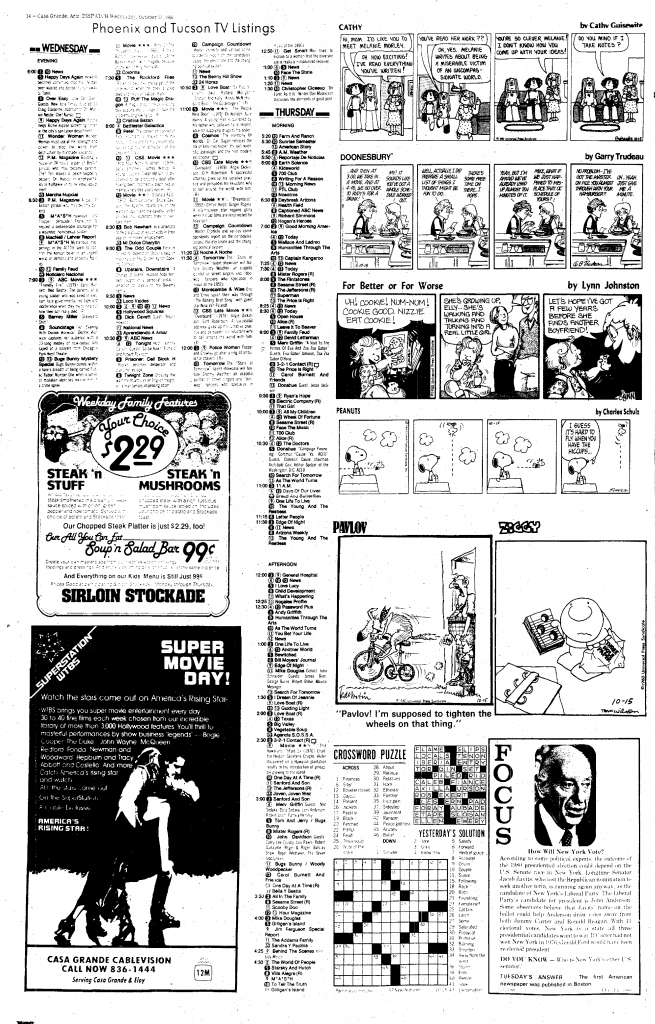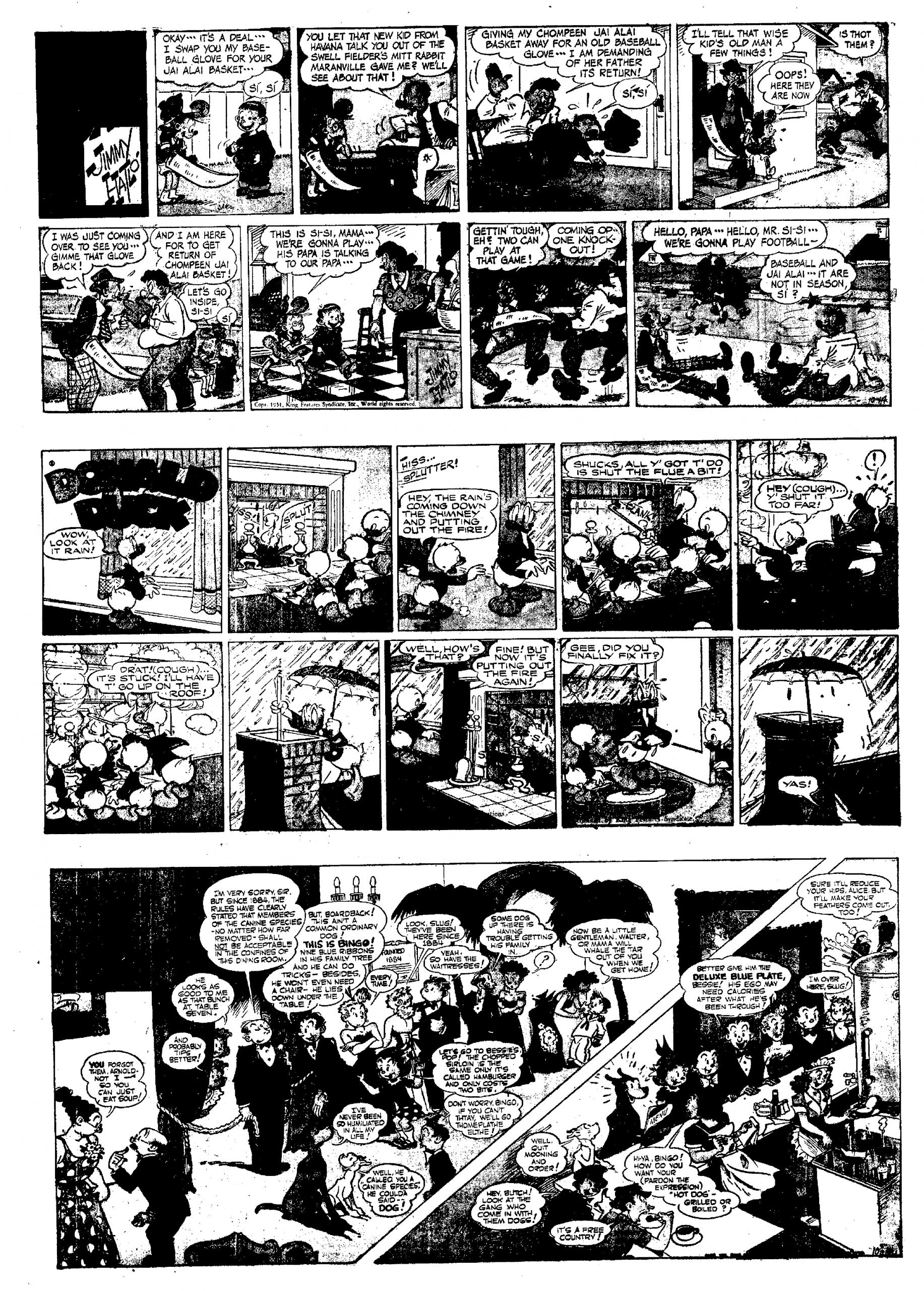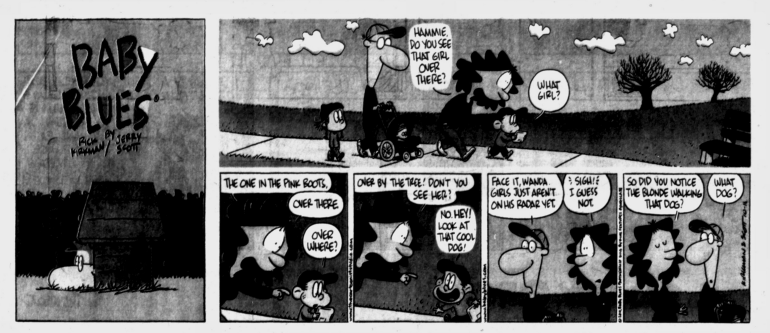The first comic I pulled out is an edition of ‘Baby Blues’ from The Quincy Herald Whig, published on October 16th, 2011. Baby Blues first appeared in papers in 1990, and has been published in the Sunday comics all over the country since then. The comic strip is centered on the Macpherson family as they raise their three kids. In this specific comic, the parents are on a walk when the mom tries to point out a girl her son’s age. The son is too distracted looking at a cute dog to notice, and the parents make a joke about how he isn’t interested in girls yet. Then, when the mom mentions the dog, the dad comments about how he didn’t notice a dog with the girl (presumably because he was staring at the girl).
This strip is a great demonstration of how the Sunday comics’ intended audience was both kids and adults. There are often jokes that adults will find humorous, but will go over kids’ heads. I know if I read this comic as a kid, I definitely wouldn’t have understood the second part of the punchline, but now as an adult, I find it funny!

Next, from the Casa Grande Dispatch published on October 15th, 1980, I found two comic strips that I particularly enjoyed. The first was a strip from Peanuts, the comic that brought us iconic characters like charlie brown and Snoopy. Peanuts ran from 1950 to 2000, and was adapted into multiple television series and films. In this strip, Snoopy is sitting in his iconic dog house watching his bird friend Woodstock try to fly with the hiccups. Woodstock is seen flying straight up and backwards, his direction being changed by his hiccups.
The Second comic I liked from this page was part of the comic strip Ziggy. First published in 1968, Ziggy is named after its main character, who experiences a series of comical inconveniences. In this particular strip, Ziggy is looking up in disappointment after discovering the three-hole paper he purchased for his binder has three random holes in the middle of the page instead of the side of the paper.
(1945 – 1980s) The Gazette: Donald Duck, 1951
Did you know that Donald Duck had his own comic strip? I didn’t until I stumbled upon one in the Gazette, published on October 14th, 1951. In this edition, the Duck family, featuring Donald and his nephews Huey, Dewey, and Louie, try to keep their fireplace lit. The problem they encountered was that rain coming down the chimney kept putting it out. Donald tries a couple of different solutions, but the one that works is putting an umbrella at the top. You can’t say that’s not creative!

Next is a comic from a series that I haven’t seen before, which I found in the Graettinger Times, published on October 13th, 1932. Upon further research, it seems that the Featherheads had a relatively short run in the papers, and there isn’t a ton of information about it online. In this strip, one man is reading his newspaper while the man next to him keeps getting increasingly closer as he reads over his shoulder. As the man holding the paper gets increasingly irritated with the personal space invader, the invader gets angry at the story he is reading in the paper. Finally, the invader exclaims that the story is crazy, and that person must have some nerve. This, of course, is ironic because the man himself definitely also has some nerve because he intruded on a stranger’s personal space!
(1824 – 1925) The Pocatello Tribune: Freckles and His Friends, 1924
The final comic I have for you today is from The Pocatello Tribune, published on October 13th, 1924. This strip is from a series titled Freckles and His Friends, which follows a boy and his friends living in a small town. The series ran from 1915 to 1971 in various papers. In this edition, Freckles and his friend are walking to class while they talk about their upcoming test on state capitals. Freckles proudly says he has them all memorized, and his friend says the one he is struggling with is New Mexico. Freckles claims that New Mexico actually has two capitals, and when questioned, tells his friend that it has a capital N and a capital M. I think it’s safe to say that Freckles probably isn’t going to pass that test.
I hope you enjoyed reading these comics with me! It’s always fun to find something other than articles in the community history archives. Join me again next week to discover more of history’s hidden gems and timeless tales!
Explore the “Read All About It” archives to read stories that spotlight our partners and their communities, announcements from our team, updates on current projects, and so much more. Discover articles about engagement, outreach, primary sources, community, digitization, education, and other topics of interest. Delve into the happenings in this week in history and take a deep dive into the events and people who helped shape our communities, our nation, and the world.
Hear Ye, Hear Ye, READ ALL ABOUT IT!
Advantage Archives works to build strong, community-based partnerships to provide free online access to local history, making it discoverable and easily accessible to anyone, anywhere, at any time, on any device. This allows communities to understand and connect to their past in a meaningful way. Through the Community History Archive search platform, we provide the community with the means to explore, discover, learn from, connect with, and share the stories of the people, places, and events that shaped their community.
The Community History Archives are intended to serve as a “portal to the past”, allowing local primary source documents to give an accounting of history as told by the individuals that witnessed it. Advantage Archives guiding principals center around building strong community-based partnerships, which is why we enter into them with the intent of shouldering our fair share, and taking the burden off of the community for the ongoing costs associated with storage, hosting, development, and maintenance of the Community’s History Archive. We are an active participant in the community’s efforts to make their collective history more accessible. The Community History Archives are maintained for free by Advantage and do not require a subscription, seat license, annual support contract, or any other ongoing costs or expenses to the institution or members of the community.
If you would like to see more local history online, please contact your local library, newspaper publisher, genealogical society, historical society, or educational institution, and encourage them to learn more about creating a Community History Archive or have them contact Advantage Archives at (855) 303-2727



